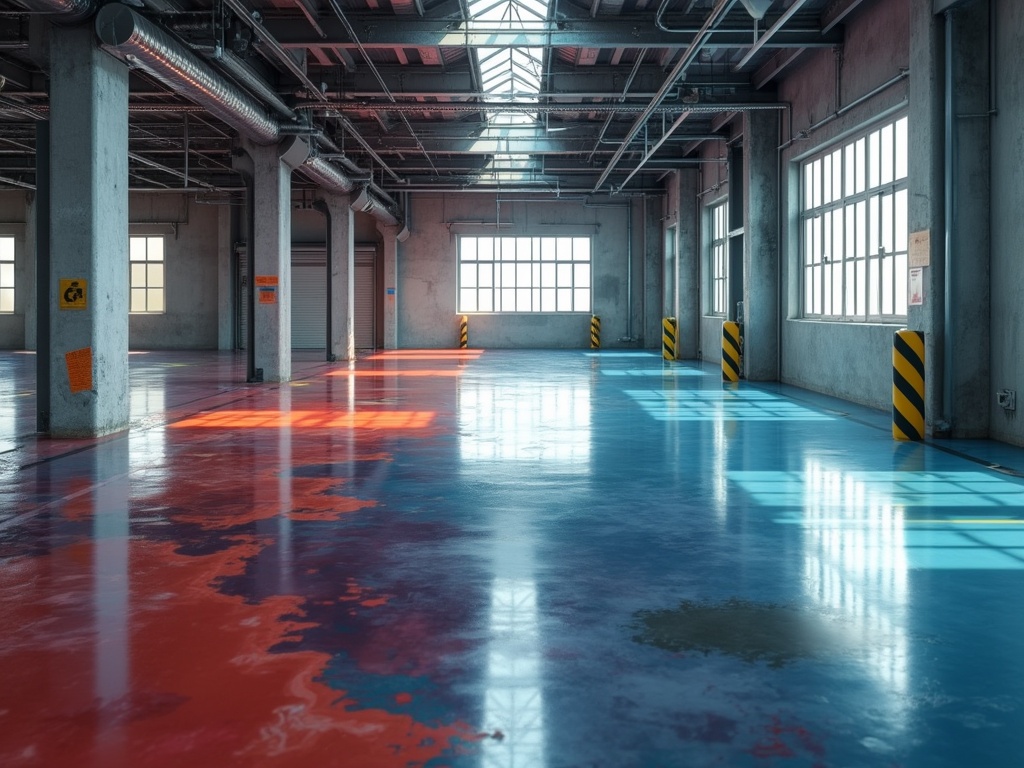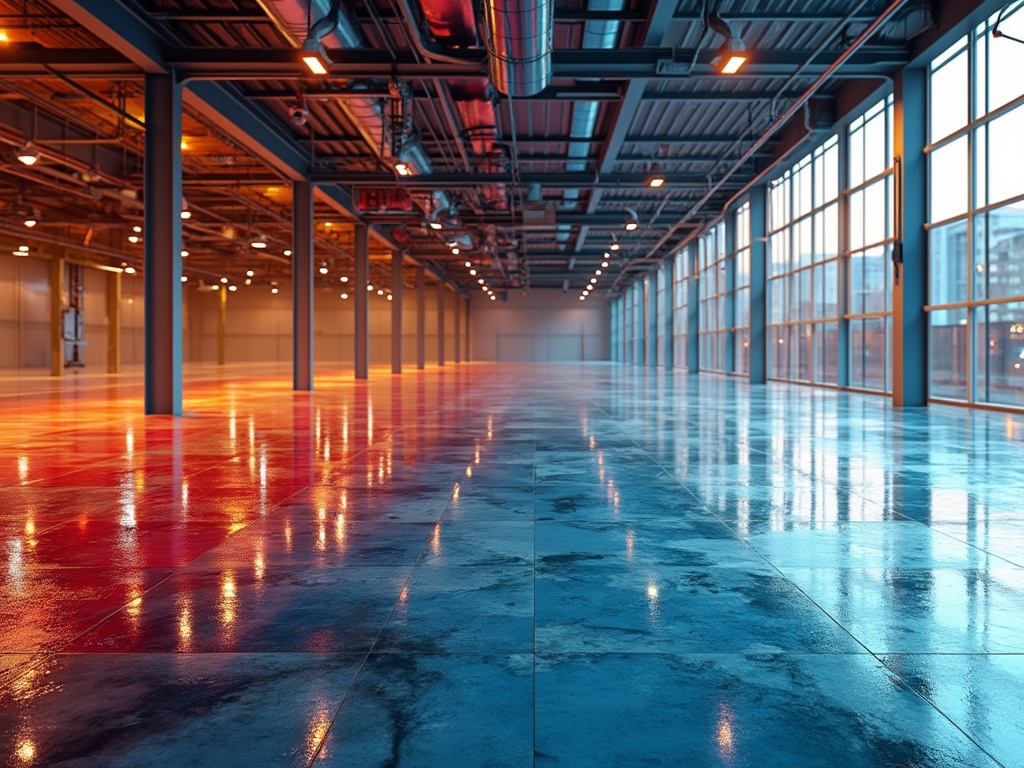
Innovative flooring solutions are making waves in College Station’s interior design scene. Homeowners and businesses alike are embracing resin coatings for their exceptional qualities.
These polymer surfaces offer a perfect blend of functionality and aesthetic appeal, transforming spaces into durable and visually striking environments.
From residential properties to commercial establishments, the applications of these seamless floors are diverse and impressive.
The advantages of advanced flooring systems go well beyond visual enhancement.
Epoxy, polyurea, and polyaspartic coatings demonstrate remarkable resilience in areas with heavy foot traffic. These industrial finishes stand up to the challenging Texas climate without compromising their integrity.
Property owners often notice an increase in real estate value after installing these professional-grade, chemical-resistant surfaces.
- Superior protection against spills and stains
- Personalized designs with various color choices
- Heightened safety features including non-slip options
As we explore the various types and applications of resin coatings, it becomes clear why they are quickly becoming the preferred choice for flooring in College Station.
Click here to learn more about: collegestationepoxy.com
Resin Coatings: Types And Applications
Protective floor coatings transform surfaces, offering a spectrum of solutions for various environments. Epoxy, polyurethane, and polyaspartic formulations each bring distinct advantages, catering to specific needs and durability enhancement requirements.
These innovative materials provide robust protection while allowing for customizable designs that suit diverse aesthetic preferences.
- Epoxy Resin:
- Exceptional resistance to chemicals and wear
- Preferred choice for industrial and commercial spaces
- Available in various finishes, including highgloss options
- Polyurethane Resin:
- Unmatched flexibility and UV resistance properties
- Optimal for outdoor areas and high-traffic zones
- Superior abrasion resistance compared to epoxy coatings
- Polyaspartic Resin:
- Quick curing, even in low-temperature conditions
- Ideal for projects requiring fast turnaround
- Combines durability with appealing aesthetics
Selecting the appropriate resin involves evaluating factors like installation complexity, long-term maintenance, and cost-effectiveness. Environmental considerations and VOC content are equally important in the decision-making process. Expert guidance ensures the optimal resin selection for specific project requirements, guaranteeing slipresistant and long-lasting results.

Why Choose Epoxy Flooring?
Resin coatings offer numerous options, with epoxy flooring standing out as an exceptional choice for various environments. Durability shines as a primary advantage, showcasing remarkable resistance to heavy foot traffic and chemical spills.
This impact-resistant quality makes epoxy surfaces particularly suitable for industrial settings, where resilience is paramount.
Facility managers value the effortless maintenance of epoxy floors.
The seamless nature of these surfaces prevents dirt accumulation, simplifying cleaning processes and ensuring a hygienic environment.
Epoxy’s resistant properties allow for quick spill clean-up, maintaining a pristine appearance with minimal effort.
- Customizable aesthetics cater to diverse preferences:
- Versatile color options align with branding requirements
- Decorative flakes or metallic pigments create unique visual effects
Environmentally conscious businesses appreciate eco-friendly options, while quick installation and fast-curing times minimize disruptions. These features, combined with epoxy’s longevity, contribute to its cost-effectiveness and popularity across various industries. The abrasion-resistant properties of epoxy flooring make it an ideal choice for high-traffic areas, ensuring long-lasting performance and reduced maintenance costs.
When considering polymer surfaces for industrial spaces, epoxy flooring emerges as a top contender due to its exceptional durability and versatility. Its ability to withstand harsh conditions and provide a safe, attractive surface makes it an invaluable asset for any facility.
| Epoxy Flooring Benefits | Traditional Flooring |
|---|---|
| Highly durable and impact-resistant | Less resistant to heavy traffic and impacts |
| Easy to clean and maintain | May require more intensive cleaning |
| Customizable with various colors and effects | Limited aesthetic options |
| Long-lasting and cost-effective | May need frequent replacement |
Polymer Surfaces For Industrial Spaces
Advanced coatings revolutionize industrial flooring, offering unparalleled protection and longevity. These innovative solutions build upon traditional epoxy strengths, delivering enhanced resilience for demanding environments.
Chemical resistance emerges as a standout feature, with industrial-grade materials effectively withstanding exposure to harsh substances self-leveling commonly encountered in warehouses and manufacturing facilities.
Exceptional performance under stress characterizes these cutting-edge surfaces.
The coatings provide superior impact resistance and easily handle constant pressure from heavy machinery, forklifts, and high-volume foot traffic.
Customizable formulations enable tailored solutions that meet specific industry requirements. Some variations offer anti-static properties, while others emphasize slip resistance or thermal shock protection, color flake systems ensuring comprehensive coverage for diverse industrial needs.
Economical benefits of these advanced surfaces include:.
- Minimized maintenance requirements
- Decreased frequency of replacements
- Prolonged lifespan of industrial floors
- Reduced downtime for repairs
Environmental considerations are addressed with low-VOC options, improving indoor air quality in industrial settings. Safety features metallic finishes such as slip-resistant textures and clear markings enhance worker protection. While functionality remains the primary focus, modern coatings can also offer aesthetic appeal, quartz aggregate bridging the gap between industrial durability and more decorative concrete options. These versatile solutions provide a seamless terrazzo-like transition from practical industrial applications to visually appealing design possibilities.
Decorative Concrete: Design Options
Innovative surface enhancements elevate ordinary floors into captivating design elements. These solutions offer a harmonious blend of visual appeal and practicality, satisfying diverse preferences and functional requirements.
- Metallic epoxy finishes:
- Produce dynamic, reflective surfaces that mesmerize viewers
- Enable tailored color combinations to complement any interior eco-friendly scheme
- Deliver robust and easy-to-clean surfaces for enduring elegance
- Flake systems:
- Yield textured, slip-resistant flooring for improved safety measures
- Present numerous color and pattern selections for distinctive designs
- Perform exceptionally in high-traffic zones, making them solvent-free suitable for commercial applications
- Stained concrete:
- Instill organic, earthy aesthetics to existing concrete surfaces
- Available in acid-stained or water-based varieties for adaptability
- Revitalize and upgrade current concrete floors cost-effectively
The condition of the substrate plays a significant role in selecting the appropriate decorative technique. Thorough preparation ensures optimal adhesion and longevity of the chosen finish. Maintenance requirements vary among options, with metallic epoxy and flake systems typically stain-resistant demanding minimal upkeep, while stained concrete may benefit from periodic resealing to maintain its protective qualities.
Seamless Floors: Installation Process
Creating a continuous surface requires precision and expertise. Professional contractors employ a systematic approach to achieve impeccable results.
The process starts with thorough substrate preparation, laying the groundwork for a successful installation.
Experts begin by cleaning and examining the concrete base.
Grinding or shot blasting may be necessary to create an ideal surface profile for optimal adhesion.
Technicians then apply a high-quality primer, allowing proper waterproof membranes curing time before moving forward. This step is vital for overall durability and longevity.
Skilled workers then install a durable base coat, often incorporating color and design elements.
This layer establishes a smooth foundation for the final application. A clear, protective topcoat seals and enhances the floor’s appearance while providing additional resistance to chemicals and wear.
- Each layer requires specific curing times
- Proper surface preparation ensures longevity
- The process significantly contributes to overall durability
Industrial Finishes: Durability Matters
Protective coatings serve as the first line of defense in manufacturing facilities and warehouses. These robust solutions shield surfaces from daily wear and tear, ensuring longevity in high-traffic areas.
Impact resistance proves essential where heavy machinery operates, preventing damage from dropped tools and equipment.
Advanced formulations offer superior abrasion protection, resisting scratches and scuffs caused by frequent movement.
UV-resistant options extend the life of outdoor industrial surfaces, while customizable hardness levels cater to specific application needs.
Durable industrial finishes provide significant benefits for commercial settings:.
- Reduced need for frequent topcoat selection and reapplication
- Cost-effectiveness over time due to longer-lasting results
- Enhanced safety through slip-resistant formulations
- Improved aesthetics with a range of color options
Proper maintenance practices, including regular cleaning and prompt crack repair, can further extend the lifespan of these resilient coatings. Surface profiling before application ensures optimal adhesion, while correct primer application and mixing ratios contribute to the overall durability of the finish. When selecting an industrial coating, consider factors such as chemical resistance, ease of cleaning, and pot life to determine the best solution for your specific needs.
Industrial Coatings
- Industrial coatings can provide impact resistance against heavy machinery and dropped tools
- UV-resistant formulations extend the lifespan of outdoor industrial surfaces
- Proper surface profiling before application ensures optimal adhesion of coatings
- Factors like chemical resistance and pot life should be considered when selecting industrial coatings
Chemical-Resistant Flooring: Where Needed
Specialized surfaces designed to withstand corrosive substances are essential in various industrial settings. Laboratories require flooring that can handle accidental spills and provide a secure workspace for scientists.
Manufacturing plants benefit from durable options that endure heavy machinery and frequent exposure to harsh agents.
Food processing facilities depend on these surfaces to meet strict hygiene requirements and comply with food safety regulations.
The slip coefficient of these flooring systems is a crucial factor in maintaining workplace safety.
- Safeguards high-risk environments and enhances workplace protection
- Minimizes maintenance expenses and prolongs floor lifespan
- Aids in meeting industry-specific regulatory standards
- Offers tailored solutions for unique sector requirements
When selecting appropriate flooring options, factors such as compressive strength and resistance to specific chemicals must be considered. The chosen surface should withstand the particular substances used in the facility while providing a safe and LEED certification compliant environment. Proper installation and regular maintenance are key to ensuring optimal performance and longevity of these specialized flooring systems.
College Station Pricing Guide
Texas A&M University’s hometown offers a variety of epoxy flooring solutions to match diverse needs and budgets. Costs for high-performance coating systems fluctuate based on project scope and specifications.
Residential applications typically begin at $3-$5 per square foot, while commercial installations can range from $6-$12 per square foot, accounting for preparation work and customization.
The tensile strength of these durable coatings provides excellent long-term value for properties in the area.
Professional installations ensure optimal results, maximizing the lifespan of coated floors.
Contractors familiar with local climate conditions can recommend systems that withstand Brazos Valley weather, enhancing color stability and performance. The flexural strength of properly installed epoxy floors contributes to their longevity and durability in both residential and commercial settings.
- Financing options: Local flooring companies often provide payment plans or partner with financial institutions for larger projects.
- Seasonal pricing: Installation costs may vary slightly during peak seasons, typically spring and fall.
- Local regulations: Reputable contractors adhere to Texas state licensing requirements and municipal building codes.
Eco-conscious property owners appreciate the low-maintenance nature of epoxy flooring, which reduces the need for frequent replacements or harsh cleaning chemicals. The gloss retention of quality epoxy systems ensures a lasting aesthetic appeal, complementing both modern and traditional architectural styles found throughout College Station.
| Residential Applications | Commercial Applications |
|---|---|
| $3-$5 per square foot | $6-$12 per square foot |
| Low-maintenance | High-performance coating systems |
| Excellent long-term value | Withstands local climate conditions |
